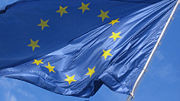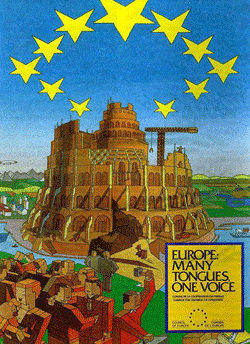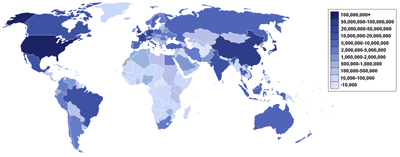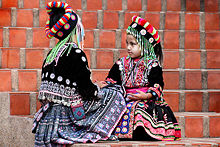
COGwriter
As regular readers of this page know, I have little respect for the publication falsely titled “Christianity Today”.
From its promoting pagan holidays, selling pagan trinkets, once or twice publishing inaccurate information about me, and endorsing false doctrine, it often errs. But this morning, in my view, it hit a new low.
It’s home page this morning stated, “Person of the Week: John Chrysostom” which linked to the following article:
John Chrysostom
Early church’s greatest preacher…
Eloquent and uncompromising preaching was typical of John and earned him the name history would remember him by: Chrysostomos—”golden mouth.” But his preaching, though considered the best in the early church, was what got him into trouble and led to his untimely death…
His large bald head, deeply set eyes, and sunken cheeks reminded people of Elisha the prophet. Though his sermons (which lasted between 30 minutes and two hours) were well attended, he sometimes became discouraged: “My work is like that of a man who is trying to clean a piece of ground into which a muddy stream is constantly flowing.”…
His lack of tact and political skill made him too many enemies—in the imperial family and among fellow bishops. For reasons too complex to elaborate, Theophilus, the archbishop of Alexandria, was able to call a council outside of Constantinople and, trumping up charges of heresy, had John deposed from office. John was sent into exile by Empress Eudoxia and Emperor Arcadius…
On the eastern shore of the Black Sea, at the edges of the empire, his body gave out and he died.
Thirty-four years later, after John’s chief enemies had died, his relics were brought back in triumph to the capital. Emperor Theodosius II, son of Arcadius and Eudoxia, publicly asked forgiveness for the sins of his parents.
He was later given the title of “Doctor of the Church” because of the value of his writings (600 sermons and 200 letters survive). Along with Basil the Great, Gregory of Nazianzus, and Athanasius, he is considered one of the greatest of the early Eastern church fathers.
With all the current flack about statements about the long-time minister of presidential candidate Barack Obama, one would think that “Christianity Today” would have been more careful than to declare a racist preacher its “Person of the Week”.
Notice that the Roman and Byzantine saint John Chrysostom preached the following in 387 A.D.:
The festivals of the pitiful and miserable Jews are soon to march upon us one after the other and in quick succession: the feast of Trumpets, the feast of Tabernacles, the fasts. There are many in our ranks who say they think as we do. Yet some of these are going to watch the festivals and others will join the Jews in keeping their feasts and observing their fasts. I wish to drive this perverse custom from the Church right now…If the Jewish ceremonies are venerable and great, our are lies…Does God hate their festivals and do you share in them? He did not say this or that festival, but all of them together. (John Chrysostom. Homily I Against the Jews I:5;VI:5;VII:2. Preached at Antioch, Syria in the Fall of 387 AD. Medieval Sourcebook: Saint John Chrysostom (c.347-407) : Eight Homilies Against the Jews. Fordham University. http://www.fordham.edu/halsall/source/chrysostom-jews6.html 12/10/05).
The wicked and unclean fast of the Jews is now at our doors. Thought it is a fast, do not wonder that I have called it unclean…But now that the devil summons your wives to the feast of the Trumpets and they turn a ready ear to this call, you do not restrain them. You let them entangle themselves in accusations of ungodliness, you let them be dragged off into licentious ways. (John Chrysostom. Homily II Against the Jews I:1; III:4. Preached at Antioch, Syria on Sunday, September 5, 387 A.D.).
So also the Law fixed the feast of Tabernacles (John Chrysostom. Homily IV Against the Jews IV:3. Catholic Christians of Antioch Turning to Sabbath and The New Moon Day and Other Holy Days. 387 A.D.).
John Chrysostom preached against the Fall holy days, because some who professed Christ were observing them. It is interesting to note that he must have realized that the second century church kept Passover the same time as the Jews did (this was even true in the early second century in Rome). And that the Catholic Church still kept Pentecost.
Thus by preaching what he did, John Chrysostom is preaching against his own church as the Roman and Orthodox Catholics claimed to keep both Passover (though on a different date, and with a different name) and Pentecost–as both of those festivals would be part of “all of them together”.
Furthermore, it should be noted that John Chrysostom had a tendency to be antisemitic and inaccurate. Here is more of what he publicly taught:
But do not be surprised that I called the Jews pitiable. They really are pitiable and miserable (I:II:1).
So the godlessness of the Jews and the pagans is on a par. But the Jews practice a deceit which is more dangerous (I:VI:4).
Do you see that demons dwell in their souls and that these demons are more dangerous than the ones of old? (I:VI:7).
Since it is against the Jews that I wish to draw up my battle line, let me extend my instruction further. Let me show that, by fasting now, the Jews dishonor the law and trample underfoot God’s commands because they are always doing everything contrary to his decrees. When God wished them to fast, they got fat and flabby (VI:IV:2).
Indeed, the fasting of the Jews, which is more disgraceful than any drunkenness, is over and gone (VIII:I:5).
In speaking about this feast of the Passover, the Law says to them something such as this: “You will not be able to keep the Passover in any of the cities which the Lord your God gives to you.” The Law bids them keep the feast on the fourteenth day of the first month and in the city of Jerusalem. The Law also narrowed down the time and place for the observance of Pentecost, when it commanded them to celebrate the feast after seven weeks, and again, when it stated: “In the place which the Lord your God chooses.” So also the Law fixed the feast of Tabernacles. (4) Now let us see which of the two, time or place, is more necessary, even though neither the one nor the other has the power to save. Must we scorn the place but observe the time? Or should we scorn the time and keep the place? What I mean is something such as this. The Law commanded that the Passover be held in the first month and in Jerusalem, at a prescribed time and in a prescribed place…But the Passover comes to an end on the twenty-first of that month. If they began the feast on the fourteenth day of the first month and then continued it for seven days, they then come to the twenty-first …the Law said they must not observe those rituals outside Jerusalem (John Chrysostom. Homily IV Against the Jews IV:3-4,V:4,5. Catholic Christians of Antioch. Turning to Sabbath and The New Moon Day and Other Holy Days. 387 A.D.).
Although he is correct that the Bible specifies the dates of the Holy Days, John Chrysostom is incorrect that Jerusalem is the only place.
That is never taught in the law.
To the contrary, the Jews were not even in Jerusalem when God listed the holy days in the books of Exodus and Leviticus (Jerusalem was not taken by the children of Israel until after the death of Joshua, see Judges 1:1-8). Also, the Apostle Paul (1 Corinthians 16:8) and Polycarp, to name just two, sometimes kept the Holy Days in Asia Minor.
But the point is that mainstream “Christians” praise one who was antisemitic and did not understand the Bible.
Notice what the Roman Catholic Church says about John Chrysostom:
Chrysostom has deserved a place in ecclesiastical history, not simply as Bishop of Constantinople, but chiefly as a Doctor of the Church. Of none of the other Greek Fathers do we possess so many writings. We may divide them into three portions, the “opuscula”, the “homilies”, and the “letters”…eight “Against the Jews”…
As an exegete Chrysostom is of the highest importance…it would be a mistake to underrate the great theological treasures hidden in his writings. From the very first he was considered by the Greeks and Latins as a most important witness to the Faith. (St. John Chrysostom. The Catholic Encyclopedia, 1910).
There are very few “Doctors of the Church” from a Roman Catholic perspective, but this hater of Jews and God’s Holy Days–John Chrysostom–was one of them.
Interestingly, Pope Benedict XVI brought up the subjects of John Chrysostom and the biblical Holy Days on apparently the same day.
According to a 9/20/07 article by Zenit, on Wednesday (September 19, 2007) the Pope’s “reflection at the general audience focused on St. John Chrysostom”–he praised him so much in that homily that he wants everyone to “pray that the Lord render us docile to the lessons of this great teacher of the faith”.
And on the same day, it was announced that when the Pontiff praised one who hated Jews and God’s Holy Days, he also claimed that the Holy Days as observed by Jews can be a source of blessings from God. Notice this news item from Zenit (a Vatican-supporting news agency):
The Jewish calendar marks Rosh Hashana (New Year) Sept. 12-14; Yom Kippur (Day of Atonement) Sept. 21-22; and Sukkot (Feast of Tabernacles) Sept. 27-Oct. 3.
“These festivities,” the Holy Father wrote, “can be occasions for many blessings from the Eternal and a source of immense joy, so that the will to promote the peace that the world so greatly needs will grow within each one of us. May God in his goodness protect your community and grant that the friendship between us deepen, in this city of Rome and everywhere.” (Benedict XVI Wishes Chief Rabbi a Happy New Year. Zenit.org 09/19/07)
Anyway, since the Holy Days provide blessings from God (blessings is a word similar in meaning to “venerable”), one would think that the Roman Catholic Church would observe them and not praise one (Chrysostom) who condemned them.
Furthermore, the New Testament calls one of the so-called “Jewish” holy days “great”. Notice the following from both a Protestant and a Catholic translation:
On the last day, that great day of the feast, Jesus stood and cried out (John 7:37, NKJV)
And in the last, the great day of the festivity JESUS stood, and cried (John 7:37, Rheims New Testament).
So who is right?
Those who follow Jesus’ practices or those who condemn them?
We in the Living Church of God follow Jesus’ practices. Those who are Catholic, Orthodox, and normally Protestant generally condemn them.
Recall that John Chrysostom once, somewhat correctly, stated,
“If the Jewish ceremonies are venerable and great, ours are lies“.
So which days should be observed? Which days should be condemned? The ones based on the Bible or those adopted from paganism?
Why do the Catholics/Protestants still like John Chrysostom?
Well for one reason, John Chrysostom got the Orthodox in Constantinople to observe Christmas on December 25:
We may take it as certain that the feast of Christ’s Nativity was kept in Rome on 25 December…It was introduced by St. John Chrysostum into Constantinople and definitively adopted in 395 (Thurston. H. Transcribed by Rick McCarty. Christian Calendar. The Catholic Encyclopedia, Volume III. Published 1908. New York: Robert Appleton Company. Nihil Obstat, November 1, 1908. Remy Lafort, S.T.D., Censor. Imprimatur. +John Cardinal Farley, Archbishop of New York ).
And as pretty much everyone who has looked into the history of Christmas knows, December 25th was selected because it was the birthday of the sun-god Mithras:
Notice the following from The Catholic Encyclopedia:
Mithraism A pagan religion consisting mainly of the cult of the ancient Indo-Iranian Sun-god Mithra…Sunday was kept holy in honour of Mithra, and the sixteenth of each month was sacred to him as mediator. The 25 December was observed as his birthday, the natalis invicti, the rebirth of the winter-sun, unconquered by the rigours of the season (Arendzen. J.P. Transcribed by John Looby. Mithraism. The Catholic Encyclopedia, Volume X. Published 1911. New York: Robert Appleton Company. Nihil Obstat, October 1, 1911. Remy Lafort, S.T.D., Censor. Imprimatur. +John Cardinal Farley, Archbishop of New York).
(For more information on this, please see the article What Does the Catholic Church Teach About Christmas and the Holy Days?)
Anyway, mainstream Christianity will continue to try to overlook the fact that it adopted pagan practices, condemned biblical ones, and still prefers traditions of men over the Bible.
Perhaps one day, publications like “Christianity Today” will examine what the Bible and the records of early church history show and condemn, instead of honor, those that preached against Jews and the practices of the true Christians.
Until then, I, and others interested in the truth, will have to remain skeptical about the publication falsely titled “Christianity Today”.
Several articles of related interest may include:
The History of Early Christianity Are you aware that what most people believe is not what truly happened to the true Christian church? Do you know where the early church was based? Do you know what were the doctrines of the early church? Is your faith really based upon the truth or compromise?
What Do Roman Catholic Scholars Actually Teach About Early Church History? Although most believe that the Roman Catholic Church history teaches an unbroken line of succession of bishops beginning with Peter, with stories about most of them, Roman Catholic scholars know the truth of this matter. This eye-opening article is a must-read for any who really wants to know what Roman Catholic history actually admits about the early church.
Location of the Early Church: Another Look at Ephesus, Smyrna, and Rome What actually happened to the primitive Church? And did the Bible tell about this in advance?
Hope of Salvation: How the Living Church of God differ from most Protestants How the Living Church of God differs from mainstream/traditional Protestants, is perhaps the question I am asked most by those without a Church of God background.
The Similarities and Dissimilarities between Martin Luther and Herbert W. Armstrong This article clearly shows some of the doctrinal differences between in the two. At this time of doctrinal variety and a tendency by many to accept certain aspects of Protestantism, the article should help clarify why the Living Church of God is NOT Protestant. Do you really know what the Protestant Reformer Martin Luther taught and should you follow his doctrinal example?
Which Is Faithful: The Roman Catholic Church or the Living Church of God? Do you know that both groups shared a lot of the earliest teachings? Do you know which church changed? Do you know which group is most faithful to the teachings of the apostolic church? Which group best represents true Christianity? This documented article answers those questions.
Some Similarities and Differences Between the Orthodox Church and the Living Church of God Both groups have some amazing similarities and some major differences. Do you know what they are?













